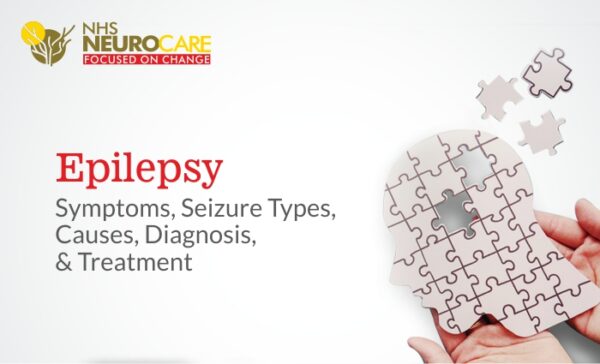Epilepsy Symptoms, Causes, Diagnosis, & Treatment
Epilepsy or Mirgi is a neurological disorder in which abnormal brain activity leads to seizures or moments of unusual behavior. sometimes, patients may also loss awareness for a period of time. Epilepsy can affect anyone regardless of gender or age. However, epilepsy treatment is prescribed depending on various factors.
Epileptic seizures can be different for different people. Some simply stare blankly for a shorter time period during the seizures while some twitch their arms or legs repeatedly. Seizures without a known trigger occurred in shorter time-gaps are generally required for diagnostic attention.
Epilepsy Symptoms
In epilepsy symptoms, seizures may affect how your brain coordinates. Signs and epilepsy symptoms of epileptic seizures may include:
- Uncontrollable jerking movements
- Stiff muscles
- A staring spell
- Loss of consciousness
- Temporary confusion
Usually, people with epilepsy encounters same type of seizures each time. They also show similar epilepsy symptoms each time The epilepsy symptoms can vary widely from person to person, and they depend on the type of seizure a person experiences. Epilepsy symptoms may vary depending on the part of the brain affected
Seizure Types
Neurologists classify epileptic seizures as in two categories, focal or generalized. The type of seizures plays an important role in prescribing seizures treatment.
- Focal seizures without loss of consciousness – these are termed as simple partial seizures, where the patient does not lose consciousness. They may experience altered emotions or change in smell, feel, taste, sound or deja vu. Such seizure may also exhibit dizziness, jerking of certain body parts, e,g. arm or leg.
- Focal seizures with impaired awareness – these are termed as complex partial seizures. Such seizures involve altered consciousness or complete loss of consciousness. During such seizures, patient may stare into space or perform unusual repetitive movements, such as hand rubbing, swallowing or walking in circles.
- Generalize absence seizures – also known as petit mal seizures, these usually occur in children. Such seizures are characterized by staring into space with or without body movements. Usually, they only last for 5-10 seconds but they may occur in resulting into brief loss of awareness.
- Tonic seizures – such seizures cause stiff muscles and patient may lose consciousness. Patient with such type of generalised seizures usually get affected in the muscles of back, arms and legs.
- Atonic seizures – also known as drop seizures are a type of generalised seizures. They cause loss in muscle control especially in the legs, causing sudden collapse or fall down.
- Clonic seizures – such generalised seizures are associated with repeated jerking muscle movements that affect the neck, face and arm muscles.
- Myoclonic seizures – such type of generalised seizures usually appear as sudden brief jerks or twitches upper body, arms and legs.
- Tonic-clonic seizures – they are the most sensational type of epileptic seizure causing an abrupt loss of consciousness, body stiffening, twitching of body parts or shaking. Such patients sometimes loss control of bladder or bite their tongue.
Causes
The definite cause of epilepsy is still unknown but before prescribing mirgi treatment neurologists consider looking for the following causes.
- Genetic influence – Few types of epilepsy run in families. They are usually characterised by the types of seizures. These types of epileptic seizures are specific to genes. However, the sensitivity of the seizures may differ among the people from same families.
- Head injury – Severe head injuries that occur due to car accidents or other traumatic injury also lead to epileptic seizures.
- Brain abnormalities – Abnormalities such as brain tumours or vascular malformations can also cause epilepsy. Also, stroke is a leading factor of epilepsy in older adults age over 35 years.
- Infections – Meningitis, HIV, various parasitic infections and viral encephalitis can also cause epilepsy. Such patients are given seizures treatment depending on their conditions.
- Prenatal injury – Injuries occurred before birth may lead to brain damage resulted into epilepsy. Such injuries can be caused by several factors including infection in the mother body, malnutrition, or oxygen deficiencies.
Diagnosis
Diagnosis of epilepsy may include:
- Blood tests
- Electroencephalogram (EEG) – This is done to records the brain’s continuous, electrical activity.
- Magnetic resonance imaging (MRI) – It uses a combination of large magnets, radiofrequencies, and a computer. MRI is done to produce detailed images of organs of the body and to detect internal injuries leading to seizures.
- CT scan – This diagnostic imaging procedure uses a combination of X-rays and computer technology to produce detailed images of body. It can show a detailed view of bones, muscles, and organs.
- Lumbar puncture (spinal tap) – Under this diagnosis procedure, a special needle is pushed into the spinal canal or lower back to measure the pressure in the spinal canal and brain. A small amount of cerebral spinal fluid (CSF) is taken for further diagnosis to detect infection or other issues.
Treatment
Mirgi treatment includes management of the condition to control the occurrence of seizures. Neurologists prescribe treatment depending on the seizures type and causes. Some new epilepsy treatments and epilepsy symptoms are also being studied which include:
- Surgical procedure to treat the affected brain area causing the seizures.
- Vagus nerve in the neck is stimulated by placing a small device under the skin. This procedure still under research and not many neurologists prescribe this.
- Neurologists always focus strongly on maintaining a strict medically supervised diet.
- Medical cannabis is also being used in few countries to help patients control seizures. However, using cannabis are not allowed in India.
When to see a doctor?
Go for immediate diagnosis if you are experiencing repetitive seizures that lasts more than five minutes. Also, if you are experiencing any of the above-mentioned epilepsy symptoms, seek medical help immediately.
At NHS Neuro Care, we have a well-designed neurology department supported by expert neurologists and high-end technology for diagnosing and treating epilepsy symptoms.

